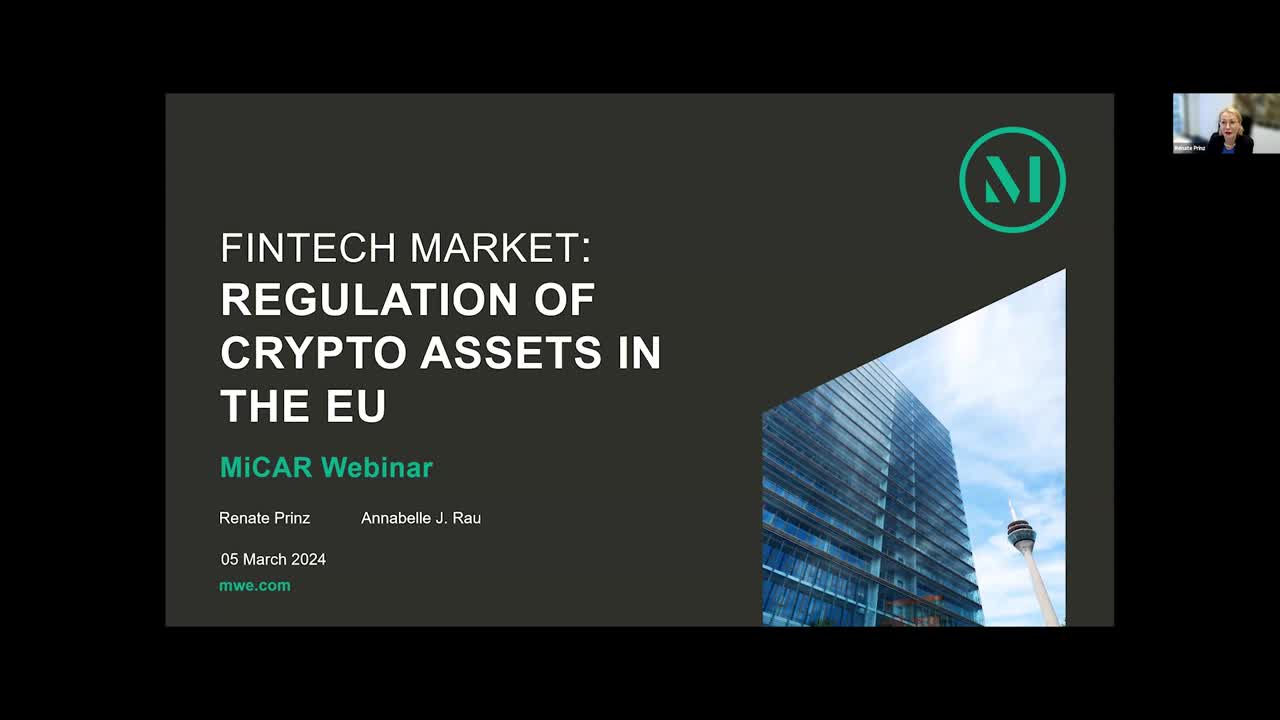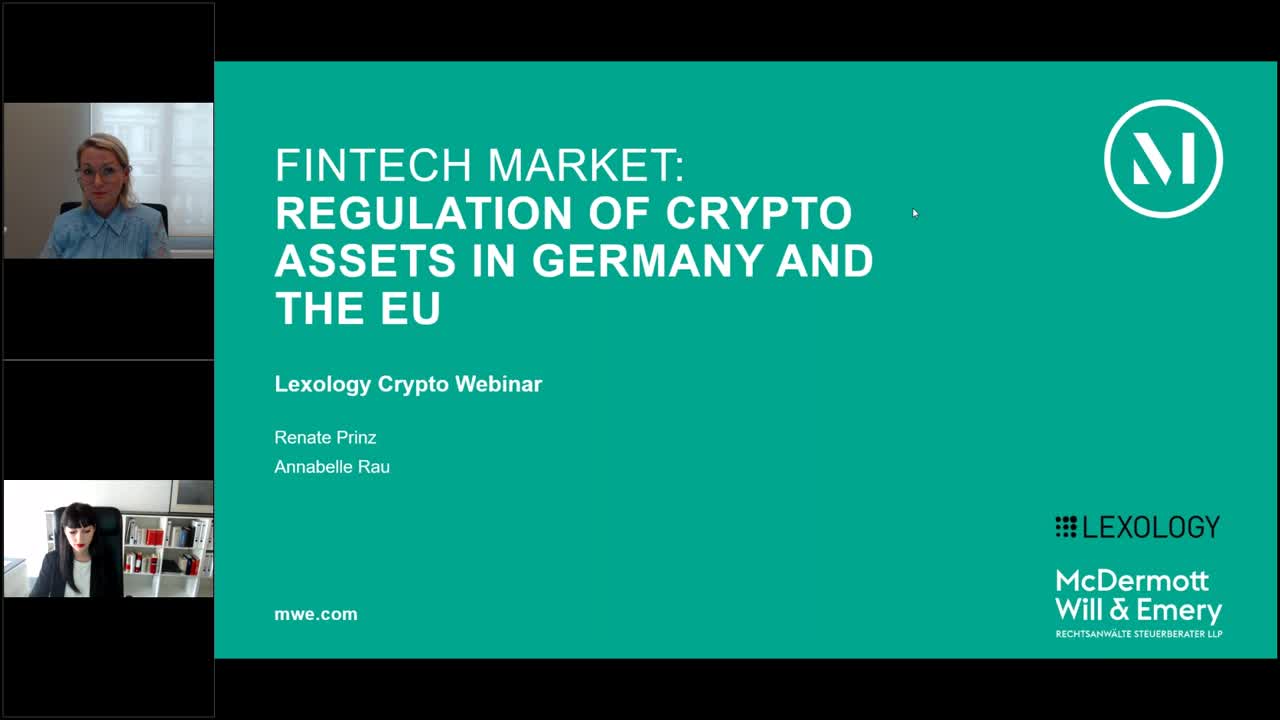Crypto Regulation
Are You Ready for MiCAR? – Webinar on the Introduction to the new EU Crypto Regulation
By Annabelle Rau | Renate Prinz on 09. February, 2024
Posted In Crypto Regulation, MiCAR
We had the pleasure to host our webinar on the new regulation of crypto-assets in the EU (Markets in Crypto-Assets Regulation (MiCAR)), with a focus on the scope of MiCAR, licensing requirements and procedures, and obligations for crypto-asset service providers in the EU. Our experts, specializing in Financial Regulatory Law with a focus on the current crypto regulation, engaged in discussions regarding the upcoming changes due to MiCAR in 2024.
The seminar was targeted at all those who were (or aspired to be) involved in the crypto scene or provided services in this domain, seeking insights into compliance with the new regulation.
You can view a recording of the session below:

FinmadiG and KMAG – Implementation of European crypto-financial market regulation in Germany
By Annabelle Rau on 29. January, 2024
Posted In Crypto Regulation, Financial Services
The German legislator has responded to the harmonization of European financial market regulations: In October 2023, the Federal Ministry of Finance published the draft bill for the Act on the Digitization of the Financial Market (Finanzmarktdigitalisierungsgesetz – “FinmadiG“), followed by the publication of the government draft of the FinmadiG just one month later.
MiCAR, DORA and money transfers – what does the FinmadiG implement?
The FinmadiG is intended to implement the following EU regulations on digital financial market regulation:
- Markets in Crypto-Assets Regulation (“MiCAR”): The first EU-wide uniform set of rules for markets in crypto assets (we provided information here, for example)
- The EU DORA package (Digital Operational Resilience Act): The financial sector-wide EU regulation of cybersecurity, ICT risks and digital operational resilience
- Revision of the EU Transfer of Funds Regulation (TFR): Including regulating the collection and disclosure of customer information in crypto transfers
New regulations on the terms “crypto assets” and “crypto custody business”
The FinmadiG is intended to harmonize the German definition of crypto assets with the European MiCAR standard. The term crypto assets will be removed from the catalogue of financial instruments of the German Banking Act (“KWG“), which means a realignment of the regulatory coverage of crypto assets. In future, crypto assets as defined by MiCAR will be directly covered and regulated by MiCAR.
At the same time, a new term – cryptographic instrument – will be introduced. This is intended to cover digital assets that do not fall within the scope of MiCAR (e.g. security tokens within the meaning of MiFID II) and must therefore continue to be regulated by the KWG and the German Securities Institutions Act.
Consequently, the previous national crypto custody business will also be renamed “qualified crypto custody business”. In future, it will apply to the custody of crypto assets that do not fall under MiCAR but qualify as cryptographic instruments within the meaning of national regulations.
In future, both issuers and providers of crypto services will therefore have to check exactly which crypto asset term the respective tokens fall under and which supervisory regime will subsequently apply.
MiCAR supervision by BaFin: the new Crypto Markets Supervision Act (KMAG)
The German Federal Financial Supervisory Authority (“BaFin“) is responsible for the supervision of crypto assets, issuers, and service providers within the meaning of MiCAR. To regulate its powers and sanctions in connection with the new regulation, a separate Crypto Markets Supervision Act (“KMAG”) is to be created.
The KMAG also addresses the possibility of a simplified licensing procedure for institutions that are already regulated. The exact structure of the simplified procedure is then to be regulated by a separate ordinance to be issued by the BMF.
Digital resilience of the financial sector: implementation of DORA
DORA addresses the digital operational resilience of financial companies in a standardized manner to create a common framework for the effective management of cyber security and ICT risks. BaFin recently published its own DORA information page on this.
To implement DORA, the FinmadiG provides for numerous amendments to national supervisory laws. This also includes authorization bases for BaFin orders in the event of violations of DORA as well as the introduction of administrative offenses that can be punished with a fine.
Crypto and money laundering: implementation of the TFR
The FinmadiG also aims to adapt national regulations to the requirements of the updated EU Funds Transfer Regulation. In future, crypto service providers will have to collect, transmit and make available information on the originators and beneficiaries of the transfers of crypto assets they carry out. In addition, such crypto service providers will continue to be considered obliged entities under money laundering law within the meaning of the Money Laundering Act (“GWG“).
Outlook
The form in which the implementation proposals of the FinmadiG will find their way into legislation remains to be seen. In particular, the dual regulation of crypto assets under MiCAR on the one hand and security tokens under MiFID II on the other, which was already laid out in MiCAR, will continue to challenge legal practitioners in the future. It is to be hoped that the German legislator will find a way of implementation that is comprehensible and legally secure in practice.
SEC approval for crypto ETF
By Renate Prinz on 11. January, 2024
Posted In Crypto Regulation
Yesterday, on January 10, 2024, the US Securities and Exchange Commission (“SEC”) made the long-awaited decision by the crypto scene to allow the listing and distribution of exchange-traded funds (“ETFs”) that track the price of the cryptocurrency Bitcoin, so-called Bitcoin spot ETFs. Specifically, 11 of these Bitcoin spot ETFs were approved by SEC, including those from major market players such as BlackRock, Ark Investments and Fidelity. The approval decision was preceded by a false report shortly before the SEC decision, which once again led to considerable market distortions. The approval took a year-long coordination process between the parties involved and the SEC, including a legal dispute in the USA last year regarding the approval of a Bitcoin spot ETF, in which the SEC was ordered by the court to review its legal assessment of Bitcoin spot ETFs. With the approval decision, the SEC has now complied with this, but has also pointed out, that Bitcoin is speculative and volatile and that Bitcoin has already been used to finance illegal activities in the past. The SEC is still not a supporter of Bitcoin. Nevertheless, the general expectation in the market is now a significant increase in crypto investments and a correspondingly strong rise in market capitalization, as institutional investors are now also more likely to have access to crypto investments (via ETFs).
The Bitcoin Spot ETFs approved by the SEC are not initially available in Germany. The approval only applies to the USA. It remains to be seen what impact the SEC decision will have on the German regulatory practice of the German supervisory authority (BaFin) in the future. Under the current legal situation, a comparable structure is not possible for ETFs launched and domiciled in Germany, as here in Germany ETFs are prohibited from investing in just one asset.
You can find the link here.
Stability through regulation
By Renate Prinz on 15. May, 2023
Posted In Banking Law, Crypto Regulation, MiCAR
The financial industry is once again facing uncertainty and turbulence, caused in particular by the demise of some banks and problems in the crypto scene. In view of the current regulatory density, the question arises whether this is sufficient to ensure the stability of the financial industry and whether it can actually help to create market security and trust. Renate Prinz classifies the current developments in the Börsen-Zeitung.
Click here to read the full article in German.
Understanding the regulatory landscape for crypto-assets in Germany and the EU
By Renate Prinz on 11. November, 2022
Posted In Crypto Regulation
Currently, you can read summaries and briefings about the new crypto asset market regulation (“MiCAR”) everywhere. Certainly MiCAR has the potential to give the EU crypto market a huge boost. From what we have seen so far, regulation for new business models, especially in the fintech market, is not as bad as everyone has assumed so far.
Renate Prinz puts the developments in FinExtra in perspective. Click here for the article.
McDermottTech 2022 – Recap
By Annabelle Rau | Renate Prinz on 21. October, 2022
Posted In Crypto Regulation, Events
From crypto, NFTs and blockchain technologies, to ethics in artificial intelligence, outsourcing and cloud deals, to trends in IP protection and enforcement in the metaverse: Together, we discussed some of the latest global trends in the technology industry at this year’s McDermottTech.
Interested in the content of our panels? Click here for the videos of our panels. You can also download the PowerPoint presentation here.
FinTech Market: Regulation of crypto assets in Germany and the EU
By Annabelle Rau on 21. September, 2022
Posted In Crypto Regulation
In this webinar, Renate Prinz and Annabelle Rau provide an overview of the current regulatory land-scape for crypto assets and crypto service providers in Germany, also taking a look at the European level, where uniform legislation for the regulation of crypto-assets is coming soon. The following fur-ther topics will be covered:
- Regulatory classification of crypto-assets in Germany.
- Licensing requirements in connection with crypto-assets and crypto-services
- Overview of the regulatory requirements for entities regulated in Germany
- Draft European crypto regulation, in particular the Markets in Crypto-Assets Regulation (“MiCAR”).
- Passporting of licenses within the EU
Click here to watch the video.
Interested in the presentation used in the webinar? Contact us to receive a PDF of the presentation.
Article in Libra: EU creates uniform rules for dealing with crypto assets
By Annabelle Rau | Renate Prinz on 16. September, 2022
Posted In Crypto Regulation
In their latest article for “Libra – das Rechtsbriefing”, Renate Prinz and Annabelle Rau present the main contents of the new “Markets in Crypto-Assets Regulation” (MiCAR), which the European Council, the EU Parliament and the EU Commission recently agreed on.
Click here to read the entire article.
EU Trilogue agreed on Markets in Crypto Assets Regulation (“MiCAR”)
By Annabelle Rau | Renate Prinz on 11. August, 2022
Posted In Crypto Regulation
The trilogue agreed on the final text for the Markets in Crypto Assets Regulation (“MiCAR“) on June 30, 2022, which now needs to be adopted by the member states (click here for the press release).
- MiCAR will for the first time create a single European legal framework for crypto assets, crypto issuers and service providers. Crypto assets have been regulated in a predominantly inconsistent manner in Europe to date.
- MiCAR provides for specific requirements for Utility Token, Value-Referenced Token and E-Money Token. It does not include Security Tokens, which are already subject to existing EU financial services regulations, and Non-fungible Tokens (“NFTs”), unless they fall under one of the crypto asset categories.
- In addition, MiCAR regulates regulatory requirements for crypto issuers (e.g., obligation to prepare a white paper) and crypto service providers (e.g., requirement for licensing and ongoing conduct of business obligations).
- New compared to the draft version is, for example, that companies on the crypto securities market are now required to submit a statement with information on their environmental and climate footprint. The content, methods and presentation of the statement will then be specified by ESMA (European Securities and Markets Authority) via technical standards.
The final text of MiCAR has not yet been published. The regulation is expected to enter into force at the end of the year, and the provisions will then be directly applicable in all EU member states after a transition period of 18 months following entry into force.

